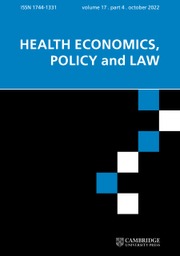Several months ago, I asked HEPL’s International Advisory Board for ideas on how to organise a 10th anniversary special issue of the journal. Jerry Hurley suggested that I commission a series of commentaries that each reflected on an article that had appeared in HEPL since its founding. This idea was embraced by several other members of the Board, so I set them, and myself, to work.
Given space limitations, I was forced to select only a few articles for commentary, which means that a great many excellent pieces of work that have appeared in HEPL are left unreflected upon in this special issue. The selection criteria used were that no more than one article was chosen from any particular issue, that some attention should be paid to secure a mix of nationality and gender across the authors, and that the entire disciplinary focus of HEPL – namely, economics, political science and law – should be adequately represented.
As I was relying on the goodwill of the members of the International Advisory Board to write the commentaries, I felt that the least I could do was to try to match them with an article that I thought would fall within their focus of research interests. In the pages that follow, the commentaries are listed chronologically, from earliest to latest.
Reflecting the very broad interests across the Board, the breadth of topics covered in this special issue is very wide indeed, and include Beveridge vs Bismarck systems; cost-effectiveness analysis; end-of-life care; equity in health care; EU health law; genetic testing; globalisation and trade in health care services; governance structures; health technology assessment; human resources; lifestyle interventions; patient choice; performance management; public involvement in health policy; public vs private financing; tobacco lobbying; social capital; the social value of life; and US health care reform. If you work in health policy, there should therefore be something that interests you in this special issue and, by extension, in HEPL more generally.
It has been an honour and, occasionally, a pleasure for me to edit HEPL over these past 10 years, watching it grow from an embryo into, I hope, an internationally respected outlet for serious interdisciplinary health policy scholarship. Its existence owes everything to Patrick McCartan at Cambridge University Press, who placed his trust in Albert Weale’s recommendation that Elias Mossialos and I could ourselves be trusted to deliver; to Elias’ commitment to see HEPL flourish; and to the administrative skills of, initially, Anna Maresso, and then, and ongoing, Azusa Sato.
Last, and perhaps most, favourable acknowledgement is owing to all those who have submitted their work to and refereed for HEPL, particularly in the early years when we had to flap our wings especially forcefully in order to get off the ground.
What else is there to say? Perhaps nothing, except here’s to the next 10 years.


